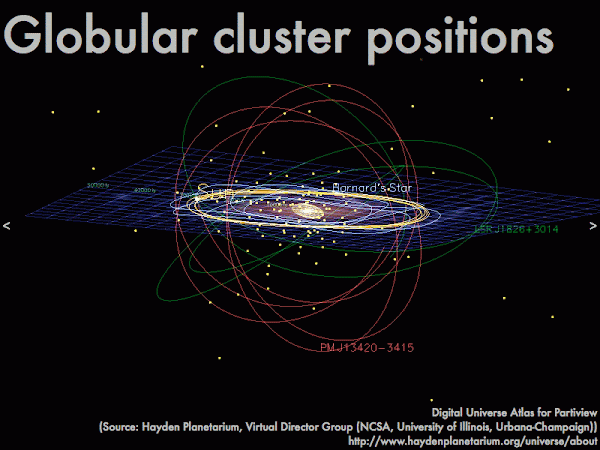Cuesta College, San Luis Obispo, CA
Students have a weekly online reading assignment (hosted by SurveyMonkey.com), where they answer questions based on reading their textbook, material covered in previous lectures, opinion questions, and/or asking (anonymous) questions or making (anonymous) comments. Full credit is given for completing the online reading assignment before next week's lecture, regardless if whether their answers are correct/incorrect. Selected results/questions/comments are addressed by the instructor at the start of the following lecture.
The following questions were asked on reading textbook chapters and previewing presentations on the Milky Way's shape, size and composition and spiral arm structure and formation.

Selected/edited responses are given below.
Describe something you found interesting from the assigned textbook reading or presentation preview, and explain why this was personally interesting for you.
"I thought it was interesting that the Greeks named the Milky Way because they believed the Milky Way was a milky river that flowed through the night sky."
"The 3D map of our Milky Way galaxy was interesting because it gave a direct sense of scope that feels more real than looking at artist depictions or being told how large it is."
"I think it was interesting learning about the Milky Way galaxy. There are many unique parts about it and all the visuals are very eye-catching."
"I found the fog model particularly interesting because of the fact that we can only see a portion of the Milky Way galaxy because of the interstellar medium. This is interesting to me because anything bigger than that is hard to even fathom."
"Our Milky Way galaxy has a disk shape. I never looked at it in that way and I'm curious as to why that is."
"The facts that gravity is smeared/spread out was such an interesting idea to me."
"The cause of density waves because I was never aware that in order to sustain its spirals, other smaller galaxies would be consumed in the process."
"That the spiral arms of a galaxy are optical illusions. Instead they are created through the movement and formation of new stars."
Describe something you found confusing from the assigned textbook reading or presentation preview, and explain why this was personally confusing for you.
"I need some clarification regarding the percentage of stars that can be observed from Earth."
"I was confused about the globular clusters and their purpose?"
"How can we see our Milky Way galaxy, because the view is 'foggy?'"
"Dark matter. I mean it makes sense, but it's just kind of confusing to me."
"I am still unsure as to what dark matter is, or what it could possibly be. I have the feeling that it is particles that are either too small or too dim to reflect light or be visibly seen but still create a gravitational force?"
"The way the Milky Way galaxy is mapped confused me a little. I need a little more clarification since I don't fully understand it."
"How the spiral arms are moving and at what rate. This is confusing because I understand that density waves move the particles but is this happening over a long period of time or is it happening super fast?"
"The persistence of vision was a hard subject to understand."
"Nothing in particular was confusing. everything was straightforward."
"Nothing is too confusing--it's a little complicated but it's not confusing."
In your experience, how much of the "Milky Way" (the band of faint stars across the celestial sphere) have you been able to see in the night sky?
As much as can be seen with the naked eye. ************* [13] Not very much. ********** [10] Barely seen it. ** [2] (Never been able to see it.) * [1] (Unsure/guessing/lost/help!) [0]
Using the most powerful light-gathering optical telescopes in the darkest skies, __________ of the stars in our entire galaxy can be observed from Earth.
1%. ****** [6] 5%. *** [3] 10%. ********** [10] 50%. ** [2] 100%. [0] (Unsure/guessing/lost/help!) ***** [5]
 If you did not have access to a mirror while camping, what could you do to find out whether or not you're having a bad hair day?
If you did not have access to a mirror while camping, what could you do to find out whether or not you're having a bad hair day?"You could use the reflection in an area of water, presuming there is any nearby."
"If you're camping near water, you can always look at your reflection in it. Another possibility would be to just use your phone."
"Use a window or mirror of a car if you drove to the campsite. If you have sunglasses or a watch on, those would work as well."
"Look in a reflection in a tin cup or a spoon."
"In my opinion it doesn't matter about your hair if you're camping you're suppose to enjoy the nature/wilderness. If you're worried about your hair then don't go camping."
"Honestly who cares? Just throw your hair up in a bun or something and you are good to go."
"I don't particularly care what my hair looks like (that's what hair-ties are for)."
"Well I have curly hair that never changes, so it's always perfect :)"
"Never had a bad hair day :)"
"Well if I'm camping I think it's pretty safe to assume that I am having a bad hair day. But if I really wanted to lower my self-esteem, I would just ask someone."
"Ask the person you are with because you shouldn't go camping alone."
"You could touch your hair."
"Just play with my hair and just feel how messy it is."
"I just usually do a 'surface check' and see if there are any big puffs of hair protruding from my head."
"Just realize ask yourself if you have P-dog's mustache and if not, then your answer is YES I'm having a very bad hair day."
Look at PimpStar Rims (*.html) for cars, or MonkeyLectric Rims (*.html) for bikes. Briefly explain how they work.
"The wheel knows its rotational velocity and adjusts its pixels to maintain a stationary image on a rotating plane."
"The blinking lights can be timed to the speed of the wheel, giving it the ability to light up at the exactly right time, to produce a pattern on a wheel."
"They work by using a strobe modulation technique by having built in microprocessor, wireless adapter, and LED lights."
"They put out the lights or words and because of how fast it is moving, it looks constant."
"They leverage an illusion called persistence of vision. This illusion tricks you into believing these moving lights are painting an image."
"I'm not sure? Something about a flashing light and how to reacts with speed?"
"Not sure."
Ask the instructor an anonymous question, or make a comment. Selected questions/comments may be discussed in class.
"I went on a backpacking trip in the Sierras for a month, where there were no lights from any cities. I was able to see the Milky Way for the first time, and it was so beautiful because all the stars shined so bright. It was amazing, and I'll never forget it."
"Would you pimp your car out with PimpStar Rims?" (I've already pimped out my bike with something like that already.)
"How often do you ride your bike?" (Not as often as when I taught physics at UC-Davis.)
"Why don't you have any open-note, open-book quizzes or exams?" (The reading assignments and the quiz question packets are already where you answer questions with open-notes, open-book. But I do want to see how much astronomy you know inside you on the quizzes and exams, so that's why they are closed-notes, closed-book.)
"How are we able to determine our current grade in the class?" (You can add up all the points from Quiz 4 and Quiz 5 to the Midterm 1 summary page (which is the last time your points were totaled). Or you can wait until you after Midterm 2, when the summary page will once again update with your most current points.)
"Opinion on Milky Way candy bars versus the OG Milky Way galaxy?" (What if the OG Milky Way galaxy were made up of only Milky Way candy bars?)
No comments:
Post a Comment